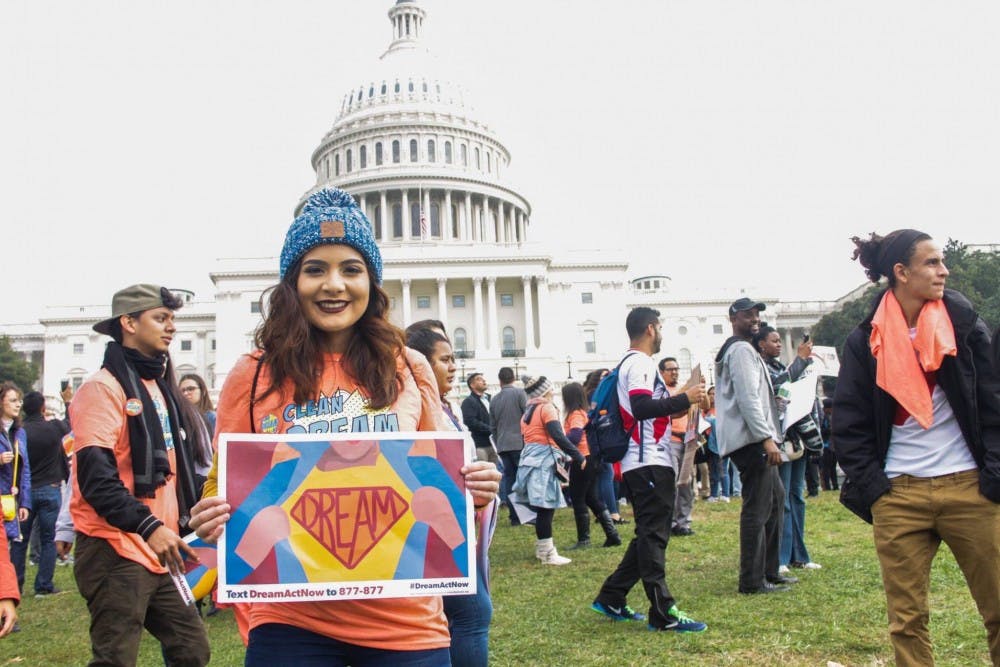Deferred Action for Childhood Arrivals student registration at ASU rose to a peak in 2018, while registration plummeted at other Arizona colleges, according to college records.
ASU experienced around a 6 percent increase in DACA students. In contrast, Maricopa Community Colleges, a network of 10 colleges with a student population of nearly 200,000, reported a drop in DACA students of around 40 percent.
The issue of DACA student registration is of particular interest in 2018, as a ruling in April from the Arizona Supreme Court denied colleges from awarding in-state tuition to DACA recipients.
Read more: Arizona Supreme Court rules DACA recipients cannot receive in-state tuition
ASU offers more opportunities for DACA students following the April ruling, including scholarships and partnerships specifically dedicated to DACA students which could account for the University's continued rise in DACA registration.
While Maricopa Community Colleges have almost twice the student population of ASU, the opportunities available to their DACA students are minimal.
Denis Alvarez, a DACA recipient and ASU sophomore studying secondary education, said she was scared she would lose her scholarship as it relied on in-state tuition, but she was able to stay as a result of the DREAM Fund, an ASU scholarship that serves to fill the tuition gap for DACA students.
However, many of Alvarez's friends and fellow DACA recipients didn’t receive aid from their community colleges, forcing them to drop out.
“Institutions in Arizona need to step up,” Alvarez said. “The only way we can pay for tuition now is with private funds. They need to ask donors, hold fundraisers, create scholarships for both DACA recipients and undocumented students.”
Judith Garcia, a DACA recipient and former student, said she had to drop out of Maricopa Community Colleges after her tuition costs rose.
While she has plans to return to college eventually, she doesn’t know how she’s going to make up the difference in tuition. Right now, she’s working full-time to build up her savings in the hopes of going back to school in the fall 2019 semester.
“For people who have been living in Arizona for years, sometimes since they were little kids, not to get in-state tuition just doesn’t make sense,” Garcia said.
The ruling forced DACA recipients into a position of paying much higher tuition rates than they might have previously anticipated. For example, in-state students will pay $9,684 at ASU for tuition while non-resident students pay $25,784.
Private institutions like Grand Canyon University and Prescott College have offered lower cost tuition and scholarships for DACA recipients as well. GCU and Benedictine University, along with ASU, have become partners with TheDream.US scholarship. As a result, the colleges have committed to providing funds to fill any financial gap between tuition cost and the scholarship.
Robert Romantic, executive director for the office of communications and public relations at GCU, said that TheDream.US program covers $8,250 for DACA students, nearly all of the in-state tuition cost.
“This amount is very close to the average amount of $8,600 that all GCU students paid last year," he said.
Romantic said that 300 to 400 DACA students attend GCU, but that they don't ask DACA students to self-identify so the exact number is not known.
Limse Thor, coordinator of student services for Mesa Community College, said that MCC continues to try and support their students.
“We put forward a couple of initiatives, but they came a little late for our students due to the Maricopa system fighting the ruling in April,” Thor said. “We came back with a black eye and lost that fight. We don’t necessarily agree with the ruling as it does hurt our students, and we like to see all of students be successful.”
At Maricopa Community Colleges, a Maricopa County resident will pay $85 per credit hour, where an out-of-state resident, or DACA student, will pay $326 per credit hour.
“Scholarships do disappear, but other scholarships constantly reappear as things come around,” Thor said. “Finances are not necessarily a good reason not to attend school. They can apply anytime, almost like jobs, they just have to keep looking.”
Reach the reporter at Jennifer.Lee.Carroll@asu.edu or follow @lacyjacy2 on Twitter.
Like The State Press on Facebook and follow @statepress on Twitter.




